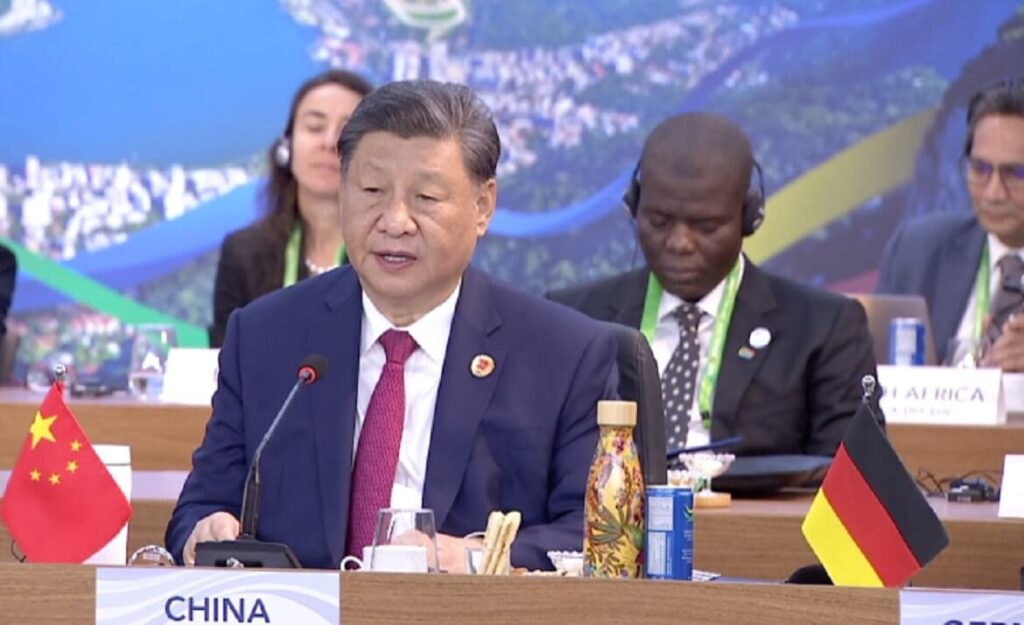By Yasir Masood
The recently concluded G20 Summit in Rio de Janeiro, Brazil, has drawn global attention, with China taking a leading role in advocating for equitable governance in an increasingly divided world.

Through a forward-looking address, Chinese President Xi Jinping emphasized collective action to tackle challenges such as economic disparities, climate change, and technological divides, underscoring China’s enduring commitment to the Global South. His speech serves as both a blueprint for progress and a reflection of Beijing’s broader strategy to foster inclusive development and revitalize multilateral cooperation.
Addressing the transformative changes reshaping the global landscape, Xi urged leaders to embrace a vision of humanity as a community with a shared future. “We must not let our vision be blocked by fleeting clouds,” he remarked, a metaphor for the distractions of short-term conflicts and unilateral interests. This perspective aligns seamlessly with the summit’s theme, “Building a Just World and a Sustainable Planet,” reinforcing China’s opposition to protectionism and unilateralism, forces that fragment global markets, deepen inequalities, and obstruct collective progress.
Central to China’s address was its unwavering commitment to the Global South. Xi reaffirmed this by declaring, “China will always be a member of the Global South.” Backing these words with action, Beijing announced initiatives including a Global South research center to bridge technological gaps, $20 billion in development funds to tackle poverty and food insecurity, and open science collaboration with key partners such as Brazil, South Africa, and the African Union. The inclusion of the African Union in the G20 as a full member, a historic milestone long defended by China, further underscores its determination to amplify the voices of developing nations.
Rafael Henrique Zerbetto, a Brazilian foreign expert at the CICG Asia Pacific Centre in Beijing, emphasized the alignment between Brazil and China in supporting multilateralism and reforms of international institutions. He noted, “International institutions, including the UN, IMF, and World Bank, were created by the post-World War II order and do not reflect the demands of our time, nor the power distribution we have in the world nowadays. Southern countries also have the right to sit at the table and take part in decision-making processes.” His observations underscore the need for a global order that better serves the interests and aspirations of the Global South.
The G20 provides a vital platform for China to expand its partnerships with developing nations including Brazil, its largest trading partner in Latin America. Xi’s visit coincides with the 50th anniversary of diplomatic ties between the two nations, highlighted by bilateral trade exceeding $158 billion this year. China’s ambitious pledge to import $8 trillion worth of goods from developing nations by 2030 offers unprecedented opportunities for the Global South to integrate into global value chains. These trade commitments, coupled with the Belt and Road Initiative, aim to bolster economic networks and foster sustainable development.
Despite its ambitious vision, China faces significant hurdles in advancing its agenda. Xi’s call for reforms to global financial institutions and the World Trade Organization (WTO) to enhance the representation of developing nations encounters resistance from entrenched interests in developed economies. But for this to translate into reality, building consensus within the G20 demands strategic and persistent diplomacy. Similarly, addressing climate change, a cornerstone of China’s G20 agenda requires overcoming inertia from industrialized nations. By embracing the principle of “common but differentiated responsibilities,” Beijing underscores the urgency for developed countries to meet their obligations.
Innovation forms a bedrock of China’s approach to progress. Xi underscored the need for robust governance in emerging fields such as artificial intelligence (AI), stating, “We must ensure AI is for good and for all, not a game of the rich countries and the wealthy.” This reflects Beijing’s commitment to bridging the digital divide and ensuring technological progress benefits all nations. Complementing these efforts, China’s leadership in digital governance through initiatives such as the G20 Digital Economy Ministers’ Meeting and the Shanghai Declaration on Global AI Governance aims to establish inclusive international standards, empowering developing economies in the technological landscape.
By prioritizing South-South cooperation and systemic reforms, Beijing positions itself as an integral force in shaping a just and sustainable world order. For the Global South, the G20 is not just a platform for dialogue but a gateway to securing a fairer share in global decision-making. Xi’s assertion that “we should see each other’s development as opportunities rather than challenges” captures this ethos and highlights the potential for shared growth.
China’s proactive diplomacy at the G20 Summit stands as a testament to its vision of unity, innovation, and sustainability. As leaders deliberated in Rio de Janeiro, the outcomes of discussions on climate action, digital governance, and poverty alleviation are poised to shape not only the next decade but also the future trajectory of global development.
Author: Dr. Yasir Masood (PhD) – Pakistani political commentator, academic, broadcast journalist, and strategic communication expert providing international relations insights for global media and think tanks.
(The opinions expressed in this article are solely those of the author and do not necessarily reflect the views of World Geostrategic Insights).







